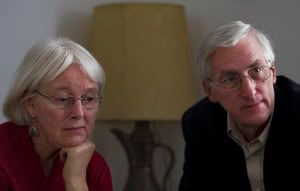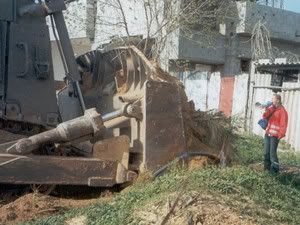
By Stephen Lendman
21 October, 2010
Defence for Children International (DCI) Palestine Section (DCI/Palestine) "is a national section of the international non-government child rights organisation and movement (dedicated) to promoting and protecting the rights of Palestinian children," according to international law principles.
Two earlier articles addressed their work, accessed though the following links:
http://sjlendman.blogspot.com/2010/04/imprisoning-palestinian-children.html
http://sjlendman.blogspot.com/2010/09/israeli-soldiers-sexually-abuse.html
Both covered Israel's systematic, institutionalized use of torture of Palestinian children as brutally as against adults. DCI/Palestine's latest September Bulletin adds more, saying:
"For the first time....three (documented) cases of children reporting being given electric shocks by Israeli interrogators (occurred) in Ari'el Settlement." Each was accused of stone throwing. Electric shocking extracted confessions although the boys maintain their innocence.
DCI and PACTI (the Public Committee Against Torture in Israel) demanded Israel investigate reports that a Gush Etzion settlement interrogator "attached car battery jump leads to the genitals of a 14-year old boy in order to obtain a confession to stone throwing."
The August 5 incident involved four boys walking near a road used by settlers when an Israeli jeep approached. "Just for fun," one boy waved. The jeep turned, was joined by others, and chased the boys. They were seized, blindfolded, painfully shackled, detained, and taken to the Zufin settlement, then to the Ari'el settlement where one boy, Raed, was interrogated.
Though innocent, "Threat of electrocution" made him confess to stone throwing, after which his head was slammed against a cupboard. He was also punched in the stomach, and a second interrogator shocked him with a handheld device, making him dizzy and shiver. He then signed a confession in Hebrew he couldn't understand, was transferred to Salem Interrogation and Detention Center, after which he was taken to Megiddo Prison, in violation of Fourth Geneva's Article 76, pertaining to the rights assured protected persons detained under occupation.
A second incident involved a 17-year old boy, Malek, falsely accused of throwing stones and Molotov cocktails. About 30 soldiers arrested and brutalized him like Raed before transferring him to Ofer Prison. On arrival, he was painfully struck on the head, then interrogated and threatened with physical violence and rape if he didn't confess. "He denied both accusations" during a two hour interrogation.
On September 15, 13-year old Khalil was arrested and accused of throwing a Molotov cocktail. At 1AM, Israeli soldiers smashed windows of his family's home, searched it, and took him to Ma'ale Adumin settlement. Though innocent, he was threatened with rape and intimidated to confess. He signed a six page document in Hebrew he didn't understand and has been detained at Ofer prison.
An earlier incident involved 16 year old Moatasem, arrested on March 20. He remains in administrative detention without charge or trial, at best hoping for a December release. Like the others, from arrest to detention, he was brutalized. During interrogation, he was asked about a plot involving a riot, bullets and weapons with no further explanation, something he knew nothing about and said so. On March 25, he was ordered administratively held for six months, then extended three more on September 26.
On average, from January 2008 - September 2010, Israel held over 300 Palestinian children captive, about 10% of them aged 12 - 15. Usually when complaints or requests for investigations into child arrests and mistreatment are submitted to the Judge Advocate General's Office (JAG), responses aren't forthcoming or issued raised are denied.
Shooting Children Collecting Building Gravel
Separately, DCI/Palestine reported on 12 incidents from May 22 - October 14, 2010, involving children aged 13 - 17, collecting gravel near Gaza's border fence with Israel. Under siege, Israel banned construction materials, forcing hundreds of men and boys to scavenge for what they can find, collecting gravel, placing it in sacks, loading it on donkeys, then selling it to builders for concrete.
In border watch towers, Israeli soldiers at times shoot and kill donkeys. They also target workers, usually shooting at their legs. In recent DCI/Palestine-documented cases, children reported being shot while working from 50 - 800 meters from the border.
In addition, a UN January 2009 - August 2010 study reported at least 22 Gazan civilians killed and 146 injured by live fire adjacent to Israel's border, including 27 children.
Of DCI's 12 documented cases, nine "were on, or outside the 300 metre exclusion zone unilaterally imposed by the Israeli army when they were shot." Under all circumstances with no exceptions, international law prohibits targeting noncombatant civilians. Israel, of course, flouts all international laws with impunity.
On November 10 and 11, DCI/Palestine in cooperation with DCI's International Executive Council and DCI International Secretariat, Geneva, will conduct an International Children's Conference titled, "Protective Environment - Active Participation," under the motto - "Together We Build and Change."
DCI explains that "Child participation is one of the four basic principles of the Convention on the Rights of the Child." Under occupation, involving them is especially important to address their collective needs, interests, and concerns. The upcoming conference thus encourages children to participate and facilitates it "by finding the spaces for them to carry it out."
Some Final Comments
On October 19, palestinethinktank.com published a wide-ranging interview with Khaled Mesh'al, since 1996, Chairman of Hamas' Political Bureau. Exiled in Damascus, he became the movement's overall leader after Israel assassinated Abdul 'Aziz Rantisi in 2004. His comments below are based on a July published interview in Jordan's Arabic language Al-Sabeel newspaper.
(1) Negotiating with Israel
Calling it a thorny and sensitive issue, he stressed that it's "not absolutely prohibited....from a legal or political perspective," but must be subject to "equations, regulations, calculations, circumstances, contexts and proper management...." Otherwise, "it becomes a negative and destructive tool."
Currently, he calls it the wrong choice, given the imbalance of power favoring Israel, saying it "refuses to withdraw from the (seized) land, and does not recognise Palestinian rights." Negotiations under such conditions are fruitless. Israel demands but won't give. On equal fair terms, negotiations are very acceptable.
(2) Recognizing Israel
As things now stand, he believes recognition means legitimizing occupation, "aggression, settlement(s), Judaization, murders, arrests, and other crimes and atrocities against our people and our land." Recognition must be earned, not demanded or given, based on equity for both sides. Israel shows no sign of agreeing.
(3) Suggesting Israel and international insistence on recognition a sign of weakness, not stength
"Without a doubt, the enemy is concerned about (its) future....no matter" its regional strength. "The demand for recognition is certainly a sign of weakness, an expression of....inferiority, (and) a feeling that it is illegitimate and still rejected" by regional states "as alien" intruders.
However, superiority feelings also come into play, or in other words, the way "Western nations deal with third world countries," believing they alone dictate terms from a position of strength, including negotiating preconditions.
(4) Why Israel and the international community reject Hamas' proposed long-term truce
First, "the logic of power." Second, "they see Arab and Palestinian parties making (better) offers." Third, Israeli and Western experience suggests pressure works best, forcing adversaries or counterparties to succumb.
(5) Hamas' resistance model
It's "a natural and authentic part of the experience of the Palestinian struggle" for liberation and ending the occupation.
(6) Hamas and international relations
First, the "conviction that the Palestine battle (is for) humanity against Israeli injustice and oppression. Second, "the necessity of promoting (the) legitimate right to resist occupation and aggression." Third, the importance of using the world stage to address injustice. Fourth, concern for developing relations at all levels. Fifth, doing it begins in the region, "the plant (to) harvest (in) the West."
(7) Hamas and Jews
"We do not fight the Zionists because they are Jews; we fight them because they are occupiers," and commit crimes against the Palestinian people. The struggle isn't about religion.
(8) Hamas and women
"Women in the Islamic concept of thought, jurisprudence, mandate and role are - indeed - one half of society, and (have) been given (their) prestige and respect. However, there is a huge difference between respect and appreciation for women and (their) rightful role (on the one hand), and abusing (them) and presenting (them) as cheap commodit(ies) as is done in the Western civilization (on the other)." In Palestine's struggle for liberation, women play a distinctive role,"not only as mothers, wives and sisters," but as activists, teachers, fighters, and providers of logistical assistance.
(9) Zionism's future
It "has no future in the region." It's in decline, and except for attacking Beirut in 1982, Israel hasn't won a war since 1967. "This is an important indicator of the Zionist project's ability....In my estimation, the 'Greater Israel' project has come to an end, simply because the Zionist enemy is no longer able to accomplish it, and because Israel continues (self-destructively) on the same path as did apartheid South Africa."
(10) Israel's role as a regional strategic asset
It's no longer so, especially after the Goldstone Report and Gaza Flotilla massacre. As a result, "Israel is falling morally, and its true ugly face is being exposed. This is a very important development." It signifies "premature aging of this enterprise....In short, the Zionist project, like all other" forms of occupation, colonizations, and aggression, "has no legitimacy because it is alien to our region and lacks the elements of survival." It will end like all the others.
(11) The region's future
It's very much in flux with years before better resolution. However, we're "confiden(t) and hop(eful) that the future will be to the benefit of the nation and the Palestinian resistance and cause....Our reading is not fanciful, and is certainly not defeatist." It's realistic and achievable.
"We are a great nation, proud of ourselves, our religion, our land, our history, our culture and identity." Palestine and Jerusalem as one is "our beating heart and an indicator of our life and survival."
Stephen Lendman lives in Chicago and can be reached at lendmanstephen@sbcglobal.net. Also visit his blog site at sjlendman.blogspot.com and listen to cutting-edge discussions with distinguished guests on the Progressive Radio News Hour on the Progressive Radio Network Thursdays at 10AM US Central time and Saturdays and Sundays at noon. All programs are archived for easy listening.
http://www.progressiveradionetwork.com/the-progressive-news-hour/















 movement are represented in the seven sectors of the conference, namely: cultural, academic, consumer, queer, labour, community, and government
movement are represented in the seven sectors of the conference, namely: cultural, academic, consumer, queer, labour, community, and government

